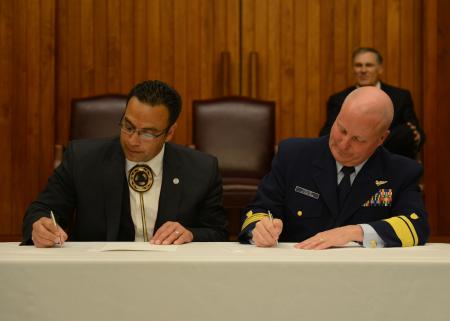SEATTLE — The U.S. Coast Guard and Makah Tribal Council signed a memorandum of agreement today to reaffirm their integral partnership, cooperation and coordination in pollution prevention and response during a ceremony at the Jackson Federal Building in Seattle.
The memorandum of agreement, or MOA, was signed by Rear Adm. Keith A. Taylor, commander of the 13th Coast Guard District, and Timothy J. Greene, Sr., chairman of the Makah Tribal Council. Also in attendance were Gov. Jay Inslee and Jennifer Griffith, chief of staff for Sen. Maria Cantwell.
The focus of the MOA is to enhance consultation, improve the leveraging of resources within respective authorities as applicable, and to improve our collective all-hazards prevention and response posture within the maritime environment that comprises the Makah treaty area.
Additionally, both organizations:
— Will meet twice a year to update, validate and prioritize a consolidated work list that frames specific cooperative efforts.
— Agree to enhance situational awareness through improved communications and coordination to include establishing communication protocols, and provide technical assistance.
— Will work to promote robust derelict vessel, fishing vessel safety and waterways analysis programs.
Will work to identify challenges and safety requirements that Makah vessels face when responding to pollution incidents.
“This MOA will solidify an enduring relationship for decades to come,” said Taylor. “The agreement establishes consensus guidelines of environmental stewardship necessary to succeed over the long-term. Additionally, the MOA will serve as a model for cooperation between Coast Guard leaders and other sovereign tribal authorities.”
“The focus of this MOA is to enhance government-to-government consultation, leverage resources within our respective authorities to improve our interoperability and coordination posture between the Coast Guard, within their area of responsibility, and the Makah Tribal Council, within our treaty area of the Washington outer coast and Strait of Juan de Fuca,” said Greene.
“The agreement signed today will help protect our ocean and coastlines from oil spills,” said Cantwell. “The Coast Guard and the Makah Nation are ideal partners to protect our coastline against the impacts of an oil spill. This partnership between the Coast Guard and the Makah Nation means they will be able to work together more effectively in oil spill prevention and response. I want to thank the men and women of the Thirteenth Coast Guard District and the Makah Nation for their work to make this happen.”
“The Makah tribe has protected the entrance to the Strait for thousands of years and the Coast Guard has extended that role to safety of all mariners and our nation,” said Inslee. “Together, we have established one of the strongest coastal oil spill prevention and response programs in the nation. Today’s agreement strengthens both that program and the common bond between nations and partners.”
The 13th Coast Guard District comprises Washington, Oregon, Idaho and Montana. The more than 4,000 active and reserve duty, civilian and auxiliary men and women annually conduct more than 3,000 search and rescue cases, save more than 300 lives, while assisting more than 700 people and saving or assisting more than $13 million in property; conduct more than 3,200 law enforcement boardings and more than 400 fisheries boardings; respond to more than 450 reported oil or chemical spills; service more than 1,800 federal aids to navigation; inspect more than 600 shoreside facilities; conduct more than 5,700 U.S. and foreign vessel inspections, including more than 2,180 port state control ontrol boardings.
According to a Coast Guard news release: As an oceangoing people, the Makah tribe has seen its treaty area change from a regional waterway where it exercised inherent sovereign authority for trade and sustenance, to an international gateway for commerce to Canada’s largest port and the United States’ third largest port complex. While the Makah people understand the importance of economic development, they also know the responsibility of defending our treaty-reserved right to sustainably utilize marine resources.
The location of their ancestral homeland centered on Cape Flattery and 40 miles offshore, including Tatoosh Island, on which the lighthouse was once fueled by the Coast Guard with whale oil. This area is strategic for accessing the marine resources found off the Olympic coast and in the Strait of Juan de Fuca.

